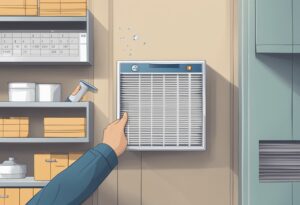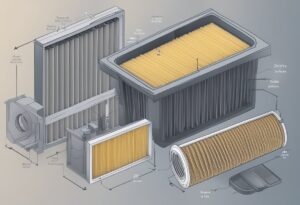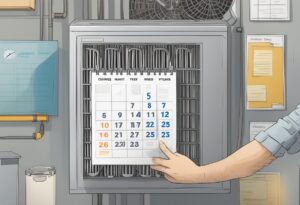Maintaining proper air quality inside a home is essential for the well-being of its occupants. One of the most crucial components of a home’s HVAC system is the air filter. It is responsible for trapping dust, dirt, and other pollutants that circulate through the air. However, many homeowners are unsure of how often they should change their air filters to maintain optimal air quality.

Changing air filters is a simple and inexpensive task that can significantly improve indoor air quality. However, the frequency of filter changes depends on various factors, including the type of filter, the size of the home, and the number of occupants. In this article, we will explore how often homeowners should change their air filters and the benefits of doing so. By the end of this article, readers will have a better understanding of how air filters work and how to maintain optimal air quality inside their homes.
Importance of Regular Air Filter Changes

Regular air filter changes are crucial for maintaining the efficiency and longevity of your HVAC system. A dirty air filter can cause a range of issues, including decreased airflow, reduced indoor air quality, and increased energy consumption.
When an air filter becomes clogged with dirt, dust, and other debris, it restricts the flow of air through the system. This makes the HVAC system work harder to maintain the desired temperature, which can lead to higher energy bills and increased wear and tear on the system.
In addition to impacting the efficiency of the HVAC system, a dirty air filter can also affect indoor air quality. A clogged filter can allow pollutants such as pollen, mold spores, and bacteria to circulate throughout the home, which can cause respiratory issues and other health problems.
To ensure that your HVAC system is running at peak efficiency and providing clean, healthy air, it is recommended to change your air filter every 1-3 months, depending on factors such as the number of occupants in the home, the presence of pets, and the level of outdoor pollution.
By making regular air filter changes a part of your HVAC maintenance routine, you can avoid costly repairs and replacements, improve indoor air quality, and enjoy lower energy bills.
Recommended Change Frequency

When it comes to changing your HVAC air filter, it’s important to do it on a regular basis to keep your system running efficiently and to maintain good indoor air quality. The recommended change frequency can vary depending on a few factors, such as the type of filter you have and your household conditions.
Standard Residential Use
For standard residential use, it’s generally recommended to change your air filter every 90 days. This is assuming that you don’t have any pets or allergies, and you’re not living in an area with high levels of pollution or dust. However, it’s always a good idea to check your filter every month and replace it if it looks dirty or clogged.
High Usage Conditions
If you have a large family or you’re running your HVAC system frequently, you may need to change your air filter more often. In these high usage conditions, it’s recommended to change your filter every 60 days. This will help to ensure that your system is running efficiently and that your indoor air quality is at its best.
Pets and Allergies
If you have pets or allergies, you’ll need to change your air filter more frequently to keep your indoor air quality healthy. For households with pets or allergies, it’s recommended to change your air filter every 30-45 days. This will help to prevent pet dander, pollen, and other allergens from circulating throughout your home.
Overall, it’s important to check your air filter regularly and replace it when necessary to keep your HVAC system running smoothly and to maintain good indoor air quality. By following these recommended change frequencies, you can ensure that your system is running efficiently and that your home is comfortable and healthy.
Types of HVAC Filters
When it comes to HVAC air filters, there are several types available on the market. Each type has its own advantages and disadvantages, and it’s important to understand the differences between them to choose the right filter for your HVAC system.
Fiberglass Filters
Fiberglass filters are the most basic and affordable type of HVAC filter. They are made of layered fiberglass fibers and are designed to capture larger particles such as dust, pollen, and lint. These filters are not effective in capturing smaller particles such as mold spores and bacteria. Fiberglass filters should be changed every 30 days or as soon as they become visibly dirty.
Pleated Filters
Pleated filters are made of polyester or cotton and have a higher MERV (Minimum Efficiency Reporting Value) rating than fiberglass filters. They are more effective in capturing smaller particles such as pet dander, mold spores, and bacteria. Pleated filters also have a longer lifespan than fiberglass filters and can last up to three months. However, they are more expensive than fiberglass filters.
HEPA Filters
HEPA (High-Efficiency Particulate Air) filters are the most effective type of HVAC filter. They are made of tightly woven fibers that can capture up to 99.97% of particles as small as 0.3 microns, including viruses and bacteria. HEPA filters are typically used in hospitals, laboratories, and other high-risk environments. They are more expensive than other types of filters and require more frequent changes to maintain their effectiveness.
In summary, the type of HVAC filter you choose depends on your specific needs and preferences. Fiberglass filters are the most affordable but are only effective in capturing larger particles. Pleated filters are more effective in capturing smaller particles and have a longer lifespan but are more expensive. HEPA filters are the most effective but are also the most expensive and require frequent changes.
Factors Affecting Change Frequency
When it comes to changing your HVAC air filter, there are several factors that can affect how often you should do it. Here are some of the key factors to consider:
Air Quality
The quality of the air in your home can have a big impact on how often you need to change your air filter. If you live in an area with high levels of pollution or if you have pets or smokers in your home, you may need to change your filter more frequently. On the other hand, if you live in a rural area with clean air and no pets or smokers, you may be able to go longer between filter changes.
Filter Quality
The quality of the air filter you choose can also affect how often you need to change it. Higher quality filters are generally more effective at capturing particles and pollutants, but they can also become clogged more quickly. Cheaper filters may not be as effective, but they may last longer before needing to be replaced.
HVAC Usage
Another factor to consider is how often you use your HVAC system. If you run your system frequently, you may need to change your filter more often than if you only use it occasionally. Additionally, if you have a large home or a lot of people living in your home, you may need to change your filter more frequently to keep up with the increased demand on your system.
By taking these factors into account, you can determine the ideal frequency for changing your HVAC air filter and keep your system running smoothly.
Identifying a Dirty Air Filter
Regularly changing your HVAC air filter is crucial for maintaining good air quality and ensuring optimal system performance. But how do you know when it’s time to replace your filter? Here are some signs that your air filter may be dirty and in need of a replacement:
- Visible dirt and debris: If you can see dirt and debris on the surface of your air filter, it’s a good indication that it’s time for a replacement. A dirty filter can reduce airflow and decrease the efficiency of your HVAC system.
- Increased energy bills: A clogged air filter can cause your HVAC system to work harder to maintain the desired temperature, resulting in higher energy bills. If you notice a sudden increase in your energy costs, it’s worth checking your air filter.
- Poor air quality: A dirty air filter can lead to poor air quality in your home, as it can’t effectively trap pollutants and allergens. If you or your family members are experiencing allergies or respiratory issues, a dirty air filter could be the culprit.
- Unpleasant odors: A musty or unpleasant odor coming from your HVAC system could be a sign of a dirty air filter. As the filter becomes clogged, it can’t effectively remove odors from the air.
In general, it’s recommended to replace your air filter every 1-3 months, depending on factors such as the type of filter, the number of people and pets in your home, and the level of air pollution in your area. By regularly checking and replacing your air filter, you can improve your indoor air quality and prolong the life of your HVAC system.
Changing Your HVAC Air Filter
When it comes to maintaining your HVAC system, changing the air filter is one of the most important tasks. A dirty air filter can cause a range of problems, from reduced airflow to increased energy bills. But how often should you really change your HVAC air filter?
Step-by-Step Guide
Changing your HVAC air filter is a simple task that can be done in just a few minutes. Here’s a step-by-step guide to help you get started:
- Turn off your HVAC system: Before you start, turn off your HVAC system to prevent any damage or injury.
- Locate the air filter: The air filter is typically located in the return air duct or near the air handler.
- Remove the old filter: Carefully remove the old filter from its housing. Be sure to dispose of it properly.
- Install the new filter: Insert the new filter into the housing, making sure that it is properly aligned and securely in place.
- Turn on the HVAC system: Once the new filter is installed, turn on your HVAC system and check to make sure that it is working properly.
Disposal of Old Filters
When disposing of your old air filter, it’s important to do so properly. Here are a few tips to keep in mind:
- Check with your local waste management facility to see if they accept used air filters for recycling or disposal.
- If your local waste management facility does not accept used air filters, wrap the filter in plastic and dispose of it in the trash.
- Never burn your old air filter, as this can release harmful chemicals into the air.
By following these simple steps, you can ensure that your HVAC system is running smoothly and efficiently. Remember to change your air filter regularly to keep your system in top condition.
Benefits of Timely Filter Changes
Regularly changing your HVAC air filter can provide a number of benefits. Here are a few reasons why you should change your air filter on a timely basis:
Improved Air Quality
One of the primary benefits of timely filter changes is improved air quality. The filter is responsible for trapping dust, dirt, and other particles that can circulate throughout your home. A dirty filter can lead to poor air quality, which can exacerbate allergies and respiratory issues. By changing your filter regularly, you can ensure that the air in your home is clean and healthy to breathe.
Increased Energy Efficiency
A dirty air filter can also impact the efficiency of your HVAC system. When the filter is clogged with debris, it can restrict the flow of air through the system. This can cause your HVAC system to work harder to maintain the desired temperature, which can increase your energy bills. By changing your filter regularly, you can help your HVAC system run more efficiently, which can save you money on your energy bills.
Extended Lifespan of Your HVAC System
Regular filter changes can also help extend the lifespan of your HVAC system. When the filter is dirty, it can cause the system to work harder than necessary, which can lead to wear and tear on the system over time. By changing your filter regularly, you can help ensure that your HVAC system lasts as long as possible.
Overall, changing your HVAC air filter on a timely basis can provide a number of benefits, including improved air quality, increased energy efficiency, and an extended lifespan for your HVAC system.
Troubleshooting Common Issues
Even with regular filter changes, HVAC systems can still experience issues. Here are some common problems and troubleshooting tips:
1. Poor Airflow
If the airflow from your HVAC system seems weak, it could be due to a dirty or clogged air filter. Check the filter and replace it if necessary. If the problem persists, it could be a sign of a more serious issue, such as a damaged blower motor or ductwork. In this case, it’s best to call a professional HVAC technician to diagnose and fix the problem.
2. Strange Noises
If you hear unusual noises coming from your HVAC system, such as banging or whistling, it could be due to a variety of issues. One common cause is a dirty air filter, which can cause the system to work harder and create more noise. Another possible cause is a loose or damaged belt in the blower motor. It’s best to have a professional technician inspect the system to determine the cause of the noise and make any necessary repairs.
3. Uneven Heating or Cooling
If some rooms in your home are warmer or cooler than others, it could be due to a variety of factors, including a dirty air filter, blocked vents, or leaky ductwork. Check the air filter and replace it if necessary. Make sure all vents are open and unobstructed. If the problem persists, it could be a sign of leaky ductwork, which can cause heated or cooled air to escape before it reaches its intended destination. In this case, it’s best to call a professional technician to diagnose and fix the problem.
By troubleshooting common HVAC issues, homeowners can keep their systems running smoothly and efficiently. Regular filter changes are an important part of HVAC maintenance, but it’s also important to address any issues as soon as they arise to prevent further damage and ensure optimal performance.
Professional Maintenance vs. DIY
When it comes to changing the HVAC air filter, homeowners have two options: professional maintenance or doing it themselves. While both options have their pros and cons, it’s important to understand the differences between the two before making a decision.
Professional Maintenance
Professional maintenance involves hiring a certified HVAC technician to inspect and change the air filter as part of a routine maintenance check. This option is ideal for homeowners who are busy or lack the necessary skills to change the filter themselves.
One of the benefits of professional maintenance is that the technician will not only change the air filter but also inspect the entire HVAC system for any potential issues. This can help prevent costly repairs down the line and ensure that the system is running efficiently.
However, professional maintenance can be more expensive than the DIY option. Homeowners can expect to pay anywhere from $50 to $150 for a routine maintenance check, depending on their location and the complexity of the system.
DIY
The DIY option involves the homeowner changing the air filter themselves. This option is ideal for homeowners who are comfortable working with their HVAC system and want to save money on routine maintenance.
One of the benefits of DIY is that it’s more affordable than professional maintenance. Homeowners can purchase air filters for as little as $5 and change them themselves in a matter of minutes.
However, DIY can be risky if the homeowner doesn’t have the necessary knowledge or skills to work with their HVAC system. If the air filter is not installed properly, it can lead to reduced airflow and decreased efficiency. Additionally, if the homeowner accidentally damages the system during the maintenance process, it can lead to costly repairs.
In conclusion, both professional maintenance and DIY have their pros and cons. Homeowners should weigh the costs and benefits of each option before making a decision. If the homeowner is comfortable working with their HVAC system and has the necessary skills, DIY may be the more affordable option. However, if the homeowner is busy or lacks the necessary skills, professional maintenance may be the better choice.

0 Comments